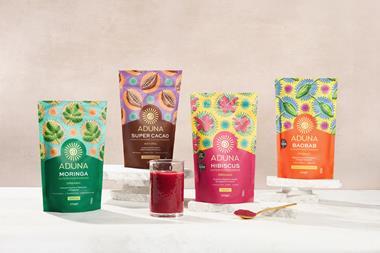L ocal and organic are yesterday's news. Seasonal and British are where it's at these days - or so the fresh produce industry would have us believe.
Next week, the NFU unveils a new scheme, endorsed by the Department of Health, that encourages UK consumers to eat five portions of British fruit and veg a day. The move follows Gordon Ramsay et al's attempts to extol the virtues of seasonality in the press. But are consumers taking any notice?
Growth in the fresh produce market may have slowed this year to 4.6% overall, but many categories, such as potatoes, soft fruit, root crops and brassicas, are thriving thanks to increasing demand for premium, locally produced and fashionable vegetable lines.
Sales of Chantenay carrots have shot up 49% in value in the past year, for instance, while volume sales of Tenderstem broccoli have soared from just 900 tonnes three years ago to a projected 2,800 tonnes this year, producers report.
During the 2007 British season, value sales of fresh broad, dwarf and runner beans and peas all surged, with broad beans up 38% between July and September.
It is with a view to encouraging people to eat even more fruit and veg that the NFU is launching 'Five a Day the British Way', a campaign aimed at a younger audience.
Part of its Why Horticulture Matters initiative, the campaign trumpets the "bare" facts about seasonal British produce with targeted editorial and images of nude models covered in fruit and vegetables in an Adam and Eve-style temptation scene.
Its message marks a significant shift away from previous national approaches, which focused only on the healthy-eating message and ignored provenance. "We realise people can't just eat British produce all the time," says Richard Hirst, chairman of the NFU board for horticulture. "We just want to get people thinking about trying to eat British where possible and see if they can at least make two to three portions British."
Not everyone is happy about the ramifications for imported produce, however. Over the past few weeks the Fresh Produce Consortium - which includes importers in its membership - has been fighting a running battle with everyone from Gordon Ramsay to Monty Don and the Soil Association over the value and logic of promoting only UK seasonal produce.
Ramsay has called for restaurants to be fined if they don't exclusively use in-season British fruit and vegetables; Don has courted controversy by arguing that British shoppers should pay a lot more for their food; while the Soil Association has said that only minimal amounts of airfreighted produce should be brought to the UK.
"I encourage and endorse the concept of eating in season, but that should be in season from the UK or elsewhere," says Nigel Jenney, FPC chief executive. "It's foolish of people to suggest we should go back to the pre-war days. The market is global now and so are consumers' tastes."
Seasonality is not what it once was, he adds. A huge amount of work has been done at producer level to extend the season, with the result that more British produce is available for longer periods of the year. The soft fruit sector, in particular, has had some striking results in extending the season.
However, that cannot compensate for the amount of produce that can't be grown in the UK and must be brought in from elsewhere, says Jenney.
According to Defra figures, the UK currently imports two thirds of all the fruit and vegetables it sells. Perhaps surprisingly, considering the impetus to buy British, the UK's self-sufficiency in fruit and vegetables has fallen from 55% in 1990 to the current 33%. This is driven largely by a drop in UK vegetable production as the fruit sector has grown.
In top fruit, the UK produces about 150,000 tonnes of the total of near-800,000 tonnes of apples sold each year, and only 30,000 tonnes of the 150,ooo tonnes of pears.
Others have tried to avoid the whole British-versus-imported debate by focusing purely on the seasonality message. The Seasonal Berries campaign, for instance, was launched last month amid some controversy.
Replacing the Summer Fruits and Winter Berries initiatives, it is promoting seasonal berries from around the world, not just Britain. The aim is to change consumer perceptions and establish berries as an "everyday, all-day, modern superfood", according to creator Sputnik Communications. It allows producers to get the benefit of year-round promotion, and not just one targeted at the growing season of a particular country, it adds.
However, the move has drawn criticism from some growers, who argue the strength of the British brand could be diluted if it is sold alongside its European and South American cousins.
Others question how committed consumers are. Denis Punter, executive chairman of Redbridge Holdings, which supplies fruit, vegetables and flowers to retail, wholesale and foodservice, says seasonality makes good headlines but consumer interest doesn't always translate into different purchasing behaviour.
"Consumers have always had a keen interest in seasonality, but TNS data suggests they want, and buy, fresh produce in and out of what some would regard as the product's natural season," he says.
"Retailers have a responsibility to provide consumers with the products they want and while some consumers see seasonality as an issue, many don't."
Pushing Brits to only eat fresh produce grown on these shores is all very well, but availability has to be maintained, which is easier said than done if the weather is bad as farmers found to their cost last summer.
Producers will be hoping 2007 was a one-off, but the portents haven't been particularly good so far: at the start of June producers of Jersey Royals were warning their crops had been submerged by unseasonably heavy rainfall and were facing a salvage operation to avoid vast tonnages being lost.
Unforeseen climatic catastrophes notwithstanding, the profile of fresh produce has never been higher as everybody from government to retailers and celebrity chefs inform the public of why they need to eat more healthily.
The NFU's campaign comes in the wake of a bewildering array of other initiatives reminding us that fruit and veg are essential to a healthy diet - from 5-a-day to Fruit & Veg for Schools, Eat in Colour, Mr Fruitness and the Food Dudes.
Whether the health message is getting through, however, is debatable. According to TNS Worldpanel figures, the British public aren't exactly clamouring to fill their baskets with the fruit and veg the health experts want them to.
The average man eats just over three portions a day, while women manage closer to 3.5. That's not bad, had the work just begun. But those figures have remained static over the past three years despite the barrage of public health notices and endless television programmes urging the public to eat better and lose weight.
Digging a little deeper, TNS suggests that just 28% of men and 32% of women manage 5-a-day. Both figures have risen five percentage points in the past two years, but they're offset by the country's bulging waistline.
According to the National Obesity Forum, 24% of men and 24.5% of women in the UK are obese, figures up by as much as a third in the past five years.
Health is and will remain at the top of the agenda for government and food manufacturers. And consumers do seem to be receptive to the message that they should be eating more fruit and vegetables. Whether awareness of the 5-a-day and British seasonality messages translates into behaviour is another question. n

















No comments yet